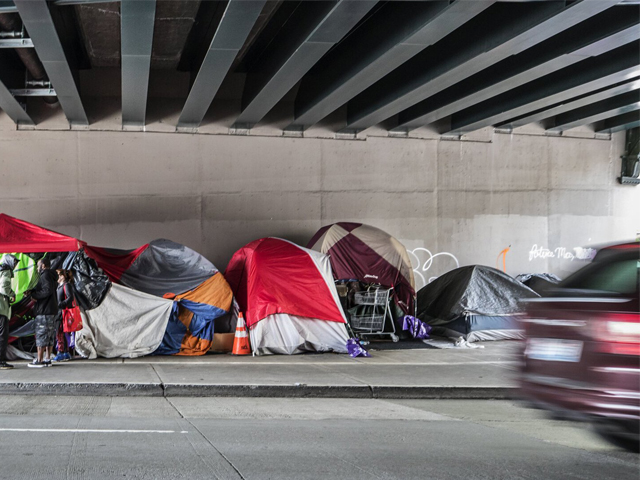Despite city government burning through more than $150 million in 2021 alone, encampments of people who need help — starting with a reliable roof overhead — sprawl across Seattle parks, greenbelts, downtown sidewalks and under most every bridge.
The latest tactic to turn the tide of this humanitarian crisis is Compassion Seattle, a measure backers hope to add to the November ballot. It’s a novel approach, essentially mandating new housing goals and services within the city charter. The measure, if approved, has the potential to drive change and meaningful outcomes and avoid Seattle’s notorious process debates.
The measure requires 33,060 valid signatures to qualify for the November election, a low bar given the urgent need to help homeless people leave the streets for shelter and human services.
This may be the perfect ballot for the measure. Consider that four citywide offices go to voters this fall: the mayor, the city attorney and two at-large council seats. With luck, Compassion Seattle and the recall of District 3 Councilmember Kshama Sawant will be added to the Nov. 2 ballot. The election holds the promise of resetting Seattle’s priorities.
A walk across almost any neighborhood shows what has gone wrong in Seattle as the homeless population grew and the pandemic shutdown emptied city streets. Needles, garbage, encampments and ramshackle recreational vehicles stretch deep into residential neighborhoods. These are pervasive symptoms of a deeply-rooted issue: Seattle has failed, across many years, to get thousands of homeless residents, many with behavioral-health issues or drug dependencies, housed.
The Compassion Seattle measure, cooked up by former interim Mayor Tim Burgess and neighborhood business groups, including the Downtown Seattle Association, can’t possibly fix this problem overnight. But the measure should be vetted, debated by candidates running for city office and ultimately put to a public vote.
Compassion Seattle calls for creation of 2,000 new housing units coupled with treatment services within one year. It would work with King County to build rapid-response behavioral-health teams that replace police interventions. The goal is a more humane process to get people off the sidewalks and out of the parks and greenbelts and into shelters, housing and treatment. United Way of King County, the Public Defender Association and Downtown Emergency Service Center — in other words, those on the front lines — already have voiced support for the measure’s aims.
Several of these same groups, and Mayor Jenny Durkan, are right to raise questions about the feasibility of the plan. Would a new mayor and council members push hard to fund 2,000 new housing units, both emergency and permanent? And services and staffing would be needed to help those persons who are the hardest to house.
King County has been spending about $5 million a month to shelter about 1,100 people in hotels in Renton, Sea-Tac, Seattle and Bellevue, according to reporting by The Times’ Project Homeless team. Seattle’s new program to rent space at the Executive Hotel Pacific and Kings Inn costs $55,724 to $62,549 per unit, per year, according to city estimates.
Recent acquisition of the just completed 76-unit Clay Apartments building on Capitol Hill for veterans and other people experiencing homelessness cost about $18.2 million — or about $240,000 per apartment, and that doesn’t include ongoing costs.
The Compassion Seattle measure raises thorny questions of funding and governance. The measure mandates 12% of the city’s general fund budget to go toward homeless services — about $15 million more than the city currently spends. The city also is already obliged to devote resources to the new Regional Homeless Authority, which is just finding its footing.
Compassion Seattle’s sponsors have done well to spotlight the homelessness debate and force the issue front and center in a busy election cycle. Voters should watch mayoral and council candidates address this proposition. That will be a powerful lens to evaluate who can be trusted to give the city effective leadership in dealing with the homeless crisis — regardless of the charter amendment’s success.
